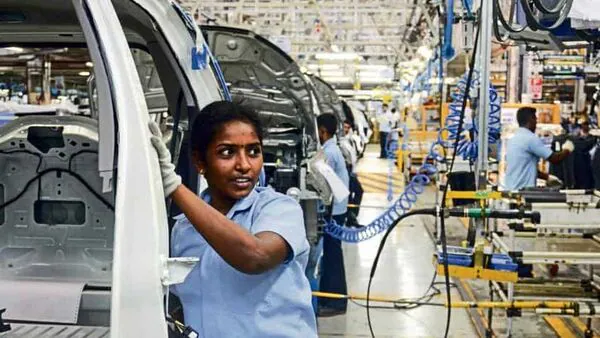
Need for a Robust Manufacturing Policy
There is no doubt that manufacturing production in the country has been adversely affected in the last few decades. It is worth noting that the contribution of manufacturing to GDP was 19.6 percent in the year 2000-01, which declined to 16.5 percent in 2013-14 and further decreased to 14.3 percent in 2023-24. If we look at various industrial sectors in depth, beyond these figures, it is revealed that the country's dependence on imports has increased terribly in almost every sector. The effect of the decline in manufacturing in API, electronics, telecom, chemicals, textiles, and many other sectors has been such that the country's dependence on other countries, especially China, increased so much that the country's trade deficit has been reaching to unbearable levels. By the year 2023-24, this merchandise trade deficit reached 238..3 billion US dollars, out of which 85 billion US dollars was the deficit from China alone. But in first 10 months of 2024-25, this deficit has increased to 243.0 billion US dollars and deficit with China to 83.52 billion US dollars. It has to be understood that no country can move forward by ignoring manufacturing. Efforts to develop manufacturing, doesn't come in way of growth in services, rather growth in manufacturing boosts service sector as well. However, generally ignoring the manufacturing sector has the biggest impact on employment. Increasing production in the service sector definitely leads to some increase in employment opportunities, but if we look at history, growth in the manufacturing sector has seen a much greater contribution to employment creation. Although in the current era, employment in manufacturing is also getting affected due to mechanization, robotization and AI, but these factors are having a greater impact on the service sector. Apart from this, due to disruption in manufacturing, the country's dependence on foreign countries increases, which can have many adverse effects. First, production in the country can stall in industries dependent on the supply of critical components, due to disruption in the supplies from foreign countries. Recently, due to the disruption in the supply of semiconductors, the country's automobiles production was hit badly and several other industries, questioning the very argument of global value chain. Secondly, the country's increasing dependence on other countries can lead to the depletion of valuable foreign exchange reserves. The effect of the recent increase in trade deficit on the country's foreign exchange reserves is a living example of the same. Thirdly, electronics and telecom, have a special importance in the modern era. Importing electronic goods from abroad can make our nation vulnerable due to control of underlying coding with the supplier country. Due to China's hostile stance with India, there may be a danger that China can weaponize this situation. Some time ago, the Ministry of Defense had issued an advisory, asking Indian soldiers to remove Chinese apps from their mobile phones for security reasons. Time and again concerns have been raised over security dangers of different kinds of Chinese electronic and telecom materials. Fourthly, China also engages in unethical activities like dumping to kill industries in the importing nations. APIs dumping by China is a living example, how China successfully killed our API industry, and made our pharmaceutical industry dependent on Chinese suppliers, endangering our health security. Goods are sold so cheaply through dumping that the production of those goods stops in the country, due to which the industrial development of the country is hampered. Later when country gets depend on foreign supplies, then the supplier country start exploiting the situation. API is the living example in this case where dependence of India on Chinese APIs made Indian Pharma industry to pay exploitative prices for APIs.
Under the influence of globalization, manufacturing policy was out of fashion since NEP days. Perhaps that is the reason why Government of India never announced any industrial policy after 1991's New Economic Policy was announced. Rather in the era of NEP, talking about the industrial policy or even manufacturing policy for the country was treated like a crime as the prevalent thought was that there is no need for an industrial or manufacturing policy because unhindered market forces, would automatically lead to international specialization and the country which can produce something more efficiently would be exporting to other countries, and import the other commodities, in which it doesn't have comparative advantage. But, the globe now has tasted the bitter outcome of globalization whereby manufacturing has been badly hit in almost all countries of the world, except China or few of its partners.
The world is now realizing the risk of high concentration of capacities in strategic industries in one single country, namely China. Over 81 percent of solar PV supply chain, 65 percent of EV manufacturing, 66 percent of lithium batteries manufacturing is with China alone. China is dominating in the supply of critical raw materials. This high concentration is endangering the world as the same can be weaponized by Chinese, and this can also be used to kill domestic industries of other countries by dumping. To deal with the situation, developed countries including US, European countries and Japan are trying to give shape to their industrial policy. The US offering hundreds of billions in subsidies and tax breaks for reviving manufacturing under 3 new Acts adopted in 2022. These include $737 billion Inflation Reduction Act, $280 billion Chips and Science Act, $550 billion. Apart from this, Biden administration imposed tariffs in May 2024 on imports of EVs ++ from China. US and other countries have been adopting several measures to foster on shoring of supply chains, including strategic interventions including incentives, subsidies, protectionism, and domestic content requirements. European Union's Green Deal Industrial Plan, European Battery Alliance, Carbon Border Adjustment Mechanism (CBAM) and Tariffs on EV imports from China are also worth mentioning in this regard. Japan has been Incentivizing on shoring of supply chains including through a US$ 2 billion fund.
Today, when the whole world including developed countries are feeling strangulated due to the fallouts of policies of globalization, and are moving towards designing their manufacturing policies, freeing them from dogma of free trade, this is the time when we stop and rethink to have a comprehensive manufacturing policy in the country.


